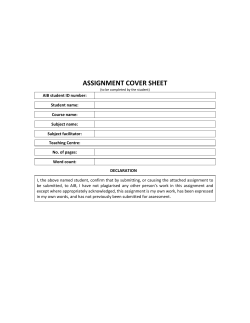
unit book
Collate and report data UBU79 L/506/1810 Learner name: VRQ Learner number: VTCT is the specialist awarding organisation for the Hairdressing, Beauty Therapy, Complementary Therapy, Hospitality and Catering and Sport and Active Leisure sectors, with over 45 years of experience. VTCT is an awarding body regulated by national organisations including Ofqual, SQA, DfES and CCEA. VTCT is a registered charity investing in education and skills but also giving to good causes in the area of facial disfigurement. Statement of unit achievement By signing this statement of unit achievement you are confirming that all learning outcomes, assessment criteria and range statements have been achieved under specified conditions and that the evidence gathered is authentic. This statement of unit achievement table must be completed prior to claiming certification. Unit code Date achieved Learner signature Assessor initials IV signature (if sampled) Assessor tracking table All assessors using this Record of Assessment book must complete this table. This is required for verification purposes. Assessor name Assessor signature Assessors initials Assessor number (optional) UBU79 Collate and report data The aim of this unit is to develop the knowledge and understanding of how to collect and report data. You will learn different ways in which to collate and present the data you have gathered. You will also learn how to report and distribute the data within agreed timescales. UBU79_v1 Level 2 Credit value 3 GLH 19 Observation(s) 0 External paper(s) 0 Collate and report data Learning outcomes On completion of this unit you will: 1. Understand how to collate and report data 2. Be able to collate data 3. Be able to report data Evidence requirements 1. Knowledge outcomes There must be evidence that you possess all the knowledge and understanding listed in the Knowledge section of this unit. In most cases this can be done by professional discussion and/or oral questioning. Other methods, such as projects, assignments and/or reflective accounts may also be used. 2. Tutor/Assessor guidance Your tutor must refer to the ‘Skills CFA Assessment Strategy’ when delivering this unit. This can be found on www.vtct.org.uk under the relevant qualification page. You will be guided by your tutor/assessor on how to achieve learning outcomes in this unit. All outcomes must be achieved. For guidance on the assessment material for some individual units please refer to the ‘Assessment Guidance’. This can be found on www.vtct.org.uk under the relevant qualification page. 3. External paper There is no external paper requirement for this unit. UBU79 3 Developing knowledge Achieving knowledge outcomes You will be guided by your tutor and assessor on the evidence that needs to be produced. Your knowledge and understanding will be assessed using the assessment methods listed below*: • • • • • • • • • • Projects Observed work Witness statements Audio-visual media Evidence of prior learning or attainment Written questions Oral questions Assignments Case studies Professional discussion Where applicable your assessor will integrate knowledge outcomes into practical observations through professional discussion and/or oral questioning. When a criterion has been orally questioned and achieved, your assessor will record this evidence in written form or by other appropriate means. There is no need for you to produce additional evidence as this criterion has already been achieved. Some knowledge and understanding outcomes may require you to show that you know and understand how to do something. If you have practical evidence from your own work that meets knowledge criteria, then there is no requirement for you to be questioned again on the same topic. *This is not an exhaustive list. 4 UBU79 Relationship to National Occupational Standards This unit is linked to Business and Administration (2013) National Occupational Standards: • CFABAD321 Collate and organise data Knowledge Learning outcome 1 Understand how to collate and report data You can: Portfolio reference a. Describe the different ways that data can be organised b. Explain why data should be presented and reported in different ways c. Explain the use of text and diagrams in helping readers to understand the presented data d. Explain the requirements relating to confidentiality, data protection, intellectual property and copyright legislations UBU79 5 Learning outcome 2 Be able to collate data You can: a. Ensure that data collected is complete, accurate and up-to-date b. Check the data against agreed criteria c. Organise data in a way that will enable meaningful analysis d. Meet agreed timescales in the collation of data 6 UBU79 Portfolio reference Learning outcome 3 Be able to report data You can: Portfolio reference a. Present data in the agreed reporting format and house style b. Report data within agreed timescale c. Distribute data reports to authorised readers UBU79 7 Notes Use this area for notes and diagrams 8 UBU79
© Copyright 2025











